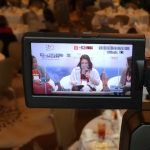 It was on my calendar Monday to log into Virtual Edge 2010 to hear Stanford professor Byron Reeves talk about how online computer games will revolutionize work and make meetings more engaging. (Reeves has a thesis that’s hard not to like: “Play is not the opposite of work.”)
It was on my calendar Monday to log into Virtual Edge 2010 to hear Stanford professor Byron Reeves talk about how online computer games will revolutionize work and make meetings more engaging. (Reeves has a thesis that’s hard not to like: “Play is not the opposite of work.”)
I also wanted to listen in on as a panel of experts talked about what has changed in the hybrid-events world since last spring. (Skeptics move over, one said. We are now in the knowledge-building part of the game.)
But when Reeves began to speak, I was on an important call with my boss. And during my second session pick, a source called me back with information about a story I was working on, so I missed the panel introductions.
Enter what I like to think of as TIVO for conferences. Virtual Edge Summit has made the entire conference available online, so I could go back and re-watch the portions of those sessions I missed. And drop in virtually on a couple of others. It’s not new technology, but it was a new experience for me to have a virtual conference feel so comfortable.
Thanks to Twitter, I now feel part of a larger community in the hybrid-event world. I read and tweeted on the conference backchannel during the panel (#VE10) — and seeing familiar Twitter handles pop up felt a lot like seeing familiar faces. Reeves’ research at Stanford bears that out: when people engage in collaborative online games, their neurons fire in ways very similar to the way that neurons fire during face-to-face encounters.
It was fun and that — as Reeves said — leads to engagement. Putting people into environments that capitalize on emotional engagement and fun experiences can be drivers of serious business.
The Virtual Edge Summit wasn’t seamless: there were some bumps, particularly when we virtual attendees first tried to log in. But it’s easy to see why this particular conference grew by 50 percent in face-to-face attendance over last year, and many more times that in virtual participation.



